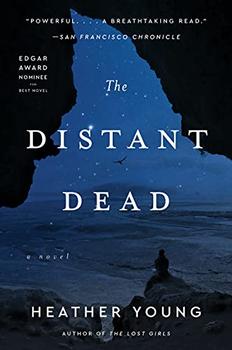Summary | Excerpt | Reviews | Beyond the book | Read-Alikes | Genres & Themes | Author Bio

"No one who lives long enough can be surprised to find their biography has been molded by distant events, by other people's wills, with little or no participation from our own decisions," writes Colombian author Juan Gabriel Vasquez in The Sound of Things Falling. Indeed the novel is a meditation on the role that chance intersections play in our lives and the crushing impact that even one wrong (and seemingly innocuous) decision can have. It is also Vasquez's ode to his city of Bogota that was ravaged by the drug war during the 80s and 90s.
A small news item about a hippo having escaped from a zoo on the outskirts of Bogota triggers a cascading series of memories in Antonio Yamarra, a young law professor. He remembers frequenting a local bar and running into the enigmatic Ricardo Laverde, a self-described retired pilot. During their brief period of acquaintance, it is clear that Laverde harbors deeper emotions than he is willing to share. Their shaky friendship is abruptly terminated when Laverde is brutally gunned down in the city and Antonio, who happens to have been with Laverde at the time, is also injured. Now he suffers from severe post-traumatic stress disorder. Determined to find out the truth about his friend's past, Antonio begins to unearth Laverde's history with the help of Laverde's daughter, Maya, a single woman who earns her living as a beekeeper in La Dorada, a town in the Magdalena valley of Colombia.
As the puzzle begins to lock into place, Vasquez, one of Colombia's most distinguished contemporary writers, paints a mesmerizing story that traces back to the drug trade and its tragic fallouts and to the many who got caught inadvertently in its crosshairs. What's worse is that even good intentions set in place by organizations such as the Peace Corps, went awry because of the tantalizing lure of riches from the smuggling of drugs. The volunteers' "expertise," Vasquez shows, was used to figure out how to turn coca paste into the "luminous white powder that all of America was hungry for."
The Sound of Things Falling, seamlessly translated from Spanish by the award-winning Anne McLean, is a beautiful love story, showing how love can move ordinary people to do extraordinary things. Vasquez vividly captures the destruction and terror visited upon his city (and country) by the drug trade - in a sense it is a rare look from the other end of the lens at the "suppliers." A poem written by Aurelio Arturo in 1929 seems particularly relevant to Bogota as it crumbled and almost perished:
"I will tell you that
one day I saw a crazed, arrogant swarming city
burn through the night
Unblinking, I watched it collapse,
and fold like a rose petal
under a hoof."
Vasquez writes, "Arturo published that in 1929: he had no way of knowing what would later happen to the city of his dream, the way Bogota would adapt itself to his lines, entering into them and fulfilling their requisites." Vasquez has acknowledged that the past is one of his many obsessions as a novelist. "I don't mean just the past," he says, "but the presence of the past among us, this strange way it has of staying with us." In that sense, Falling is an insightful exploration of precisely this phenomenon. The city that Antonio inhabits now along with his young family, has risen like a Phoenix from the ashes. All that unfortunate history, however, leaves deep scars that are hard to heal in a matter of just one generation or two.
Through the book, Vasquez wanted to "show how the drug trade affects somebody not involved in it, somebody who – like me – has never seen a gramme of coke in his life." That is precisely what he achieves so eloquently in Falling. Antonio finds his life "molded by distant events" and the attendant feeling of disillusionment feels heartbreakingly real. The players caught up in the drug wars were not innocent, they were innocents. Vasquez writes, "I'm not sure you realize what a distance there is between the two concepts." Thanks to this moving novel, we now do. We are indirect witnesses to the history that lead an entire generation of "innocents" to self-immolate with tragic consequences that continue to reverberate and haunt their children in profound and moving ways.
Additional Information
The Sound of Things Falling is the winner of the 2014 International IMPAC DUBLIN Literary Award.
![]() This review was originally published in The BookBrowse Review in September 2013, and has been updated for the
June 2014 edition.
Click here to go to this issue.
This review was originally published in The BookBrowse Review in September 2013, and has been updated for the
June 2014 edition.
Click here to go to this issue.

If you liked The Sound of Things Falling, try these:

by John Manuel Arias
Published 2024
A lush and lyrical debut novel about a Costa Rican family wrestling with a deadly secret, from rising literary star John Manuel Arias

by Heather Young
Published 2021
A young boy finds himself at the center of a murder mystery in this timely and twisty thriller from the author of the acclaimed The Lost Girls - a compelling and indelible story set in small town America that examines the burden of guilt, the bitter price of forgiveness, and the debts we owe our dead, both recent and distant.
Your guide toexceptional books
BookBrowse seeks out and recommends the best in contemporary fiction and nonfiction—books that not only engage and entertain but also deepen our understanding of ourselves and the world around us.